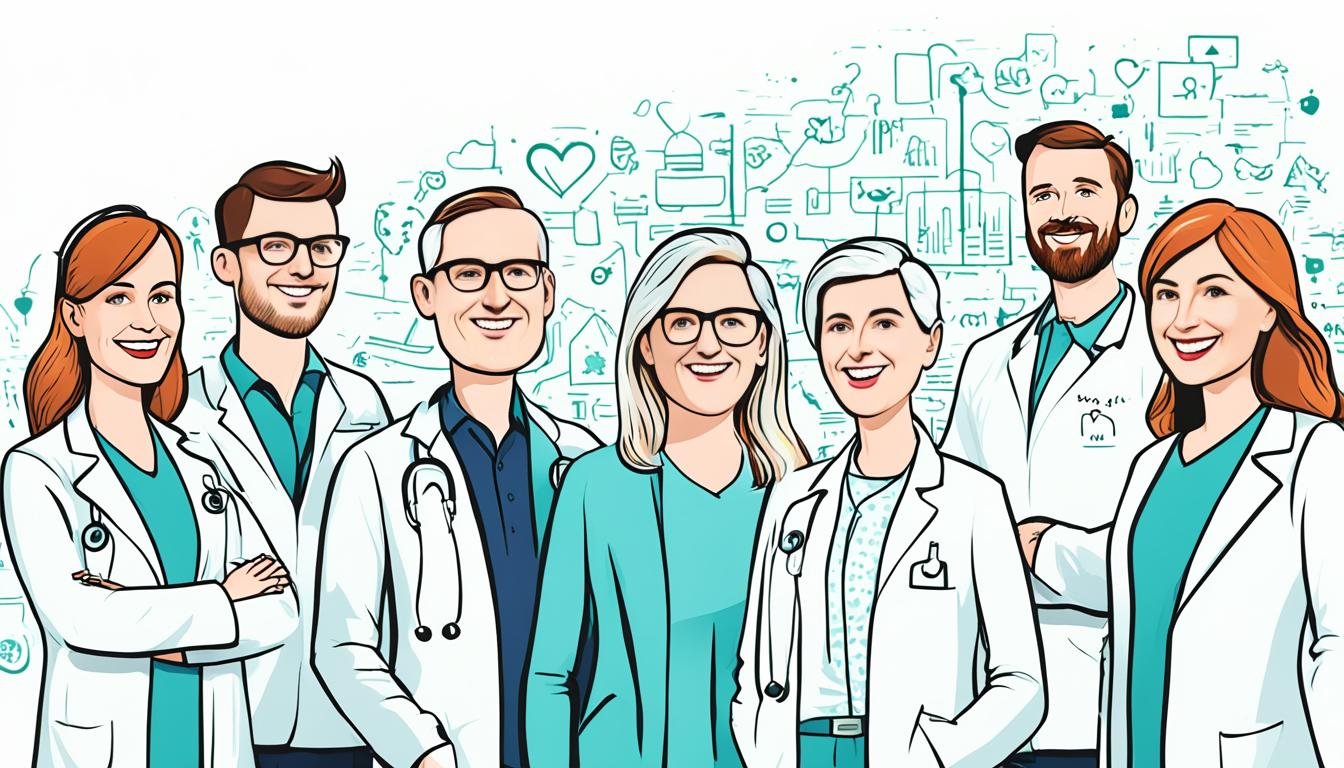The Role of Health Tech Startups in Ireland’s Healthcare Transformation
Ireland is becoming a key player in health tech, thanks to leaders like Martin Curley. He was named one of the top 10 global health leaders in 2022. This shows how health tech startups in Ireland are changing healthcare for the better. They’re making treatments more patient-focused and reducing the need for hospital visits.
Experts like Barry Scannell from William Fry and Sinead Keogh from Ibec support Ireland’s digital health push. The country excels in medtech exports and has a deep talent pool. Yet, high living costs are a challenge. A unified national strategy, as Keogh suggests, could help fully tap into digital health innovations.
Key Takeaways
- Ireland is becoming a leader in digital health, driven by the influence of health tech startups.
- The country has a robust medtech export economy and strong intellectual property laws.
- Experts highlight the need for a unified national strategy to maximize digital health opportunities.
- Challenges such as high living costs pose significant obstacles.
- Influential figures like Martin Curley play a crucial role in this transformation.
Introduction to Health Tech Startups in Ireland
Ireland has become a big name in the digital health world. It’s a place where health tech startups can grow well. This growth helped Ireland move up to 2nd place in the 2022 World Index of Healthcare Innovation.
The country’s people live a long life, with an average of 82.66 years. They also spend a lot on healthcare, about €30.5 billion in 2022. This shows how well healthcare and technology work together here.
Overview of the Irish Health Tech Landscape
The Irish health tech scene covers many areas, like platforms for consumers, analytic tools, and systems for clinical support. It uses Ireland’s strong links with big companies and skilled workers to bring new tech to life.
Things like telemedicine and electronic prescriptions got a big boost from the Covid-19 pandemic. The Department of Health and the HSE are working together on a digital health plan. This shows they’re serious about using technology in healthcare.
The Intersection of Technology and Healthcare
Ireland’s success comes from combining healthcare and technology smoothly. With more people using ePrescribing and telemedicine, there’s a lot of room for more growth.
A new group focused on telehealth and investments in key areas show Ireland’s focus on better healthcare. This focus will keep Ireland leading in digital health innovation.
Driving Forces Behind Healthcare Technology Disruption
The healthcare industry has changed a lot because of many factors. Covid-19 has been a big push for digital health solutions. Economic and tech advancements also play a big role in making healthcare innovation grow.
The Impact of Covid-19 on Digital Health Adoption
Covid-19 changed healthcare a lot, making digital health more important. With the need for social distancing, telemedicine and remote care became more popular. Bridget Clinton of Arthur Cox says Ireland has a big chance to lead in digital healthcare.
This pandemic made digital health tech more common, helping patients in new ways. It showed how digital health can improve care.
Economic and Technological Catalysts
Economic factors and tech innovation are key to changing healthcare tech. The global digital health market is expected to grow a lot by 2024. This means more chances for investment and growth.
Ireland is investing a lot in ICT for healthcare through the Health Service Executive’s national plan. This shows Ireland’s commitment to tech and its aim to lead in global health.
Advances in cloud computing, mobile and social networks, AI, blockchain, and IoT are changing healthcare. They make managing data, engaging patients, and improving care better. Ireland’s Stay Left, Shift Left (SL2) and EIT Health support show its goal to be a top spot for digital health.
The mix of economic and tech advancements is leading to big changes in healthcare tech. This means better care for patients and a stronger healthcare system.
The Role of Health Tech Startups in Ireland’s Healthcare Transformation
Health tech startups are changing Ireland’s healthcare for the better. Martin Curley leads this change with a focus on new ideas. His work matches Ireland’s tech-savvy economy, where startups are making a big difference.
Ireland is now a key place for digital health progress. The health tech startups impact is clear with the use of AI, telemedicine, and wearable tech. These tools are making patient care better by offering more precise and tailored care.
Ireland’s digital health strategy is focused on making the health system better. For example, wearable devices help manage chronic diseases by monitoring health continuously. This is key for managing conditions like diabetes and heart disease. These innovations are crucial for Ireland to lead in health tech.
Ireland has great tech talent and a strong health tech scene. It’s home to nine of the world’s top 10 medtech companies. This talent and infrastructure help health tech startups grow and change healthcare fast.
But, there are challenges like data security and privacy. The digital divide also needs attention. Working together is key to solve these issues and make digital health solutions work well.
In conclusion, health tech startups in Ireland are bringing big changes to healthcare. With its digital health strategy and growing health tech sector, Ireland aims to make healthcare more efficient, personalized, and suited for a digital world.
The Irish Startup Ecosystem: A Hotspot for Health Tech Innovation
The Irish startup scene has quickly become a key place for health tech innovation. It combines strong research and development (R&D), a good intellectual property (IP) system, and teamwork with big tech and medtech companies.
Ireland’s startup scene is known for its supportive environment that helps digital health grow. Key to its success are:
- Strategic Alliances: Working with top tech and medtech firms brings in new, innovative solutions.
- Comprehensive R&D Support: The government and companies fund R&D heavily, leading to big breakthroughs.
- Strong IP Protections: A great IP system keeps new ideas safe, making more people want to invest in tech.
Ireland also has a wide pool of skilled people. They know a lot about biomedical engineering, biotechnology, and software development. This talent pool is key to pushing health tech forward.
Launch NY also helps out a lot, offering one-on-one coaching and seed money for new ideas. These funds help startups in fields like life sciences and web tech grow and succeed in the digital health field.
Telehealth Solutions Revolutionizing Patient Care
Telehealth solutions have changed healthcare a lot. They have made healthcare more accessible and affordable. This is thanks to telemedicine services and more remote consultations.
Expansion of Telemedicine Services
Telemedicine services have grown a lot in the U.S. States like Florida, South Dakota, and Utah are leading with 14 points each. They don’t need an initial face-to-face visit. This allows for live video chats, remote care, and messages.
Telehealth helps people get specialist care from anywhere. In top states, nurses and other experts can work on their own. This makes telemedicine more available and efficient.
Benefits of Remote Consultations
Remote consultations have many benefits for patients and doctors. They cut down on the need for in-person visits. This saves resources and can lower healthcare costs.
With easy access to healthcare on phones, new services like Nomad Health have started. They offer healthcare when you need it, making it easy for patients. A McKinsey report says 40% of people want to keep using telemedicine in the future. This shows more people are using and trusting remote care.
Medical Data Analytics: Transforming Healthcare Decision-Making
The use of medical data analytics has changed how we make healthcare decisions. This has led to better patient care. Thanks to new data tech, health care in Ireland is now more focused on evidence and tailored to each patient.
Data analytics has boosted efficiency by 63% and made decisions faster and more effective by 57%. This shows how vital data-driven health care is in changing healthcare for the better.
The healthcare sector creates about 30% of all data, and this is expected to grow by 36% each year until 2025. This growth shows how important medical data analytics is for better healthcare.
The healthcare analytics market is growing fast too. It made $21.1 billion in 2021 and $27.4 billion in 2022. By 2027, it’s expected to hit $85.9 billion, growing at a rate of 25.7% annually. This shows how crucial data-driven healthcare is today.
Healthcare data is growing faster than other areas like industry, finance, and media. Tools like IQVIA’s Health Data Transformation Platform can turn vast amounts of health data into useful insights. This is key for handling large healthcare datasets.
Natural Language Processing (NLP) helps organize unstructured health data like Electronic Health Records (EHRs). This makes getting insights faster and lets organizations automate data work. This way, doctors can spend more time analyzing and making informed healthcare decisions.
A study showed that tools like IQVIA’s can cut down the time spent on cleaning data by a lot. This not only improves care quality but also supports the move to data-driven health care.
AI-Driven Diagnostics and Personalized Medicine
Artificial Intelligence (AI) is changing healthcare, especially in diagnostics and personalized medicine. AI and healthcare are coming together to make big changes. These changes help patients get better care with treatments made just for them.
Emergence of AI in Medical Diagnostics
AI is making old ways of diagnosing patients better by using new algorithms and learning from data. This makes diagnosing faster and more accurate, helping doctors catch problems early. Studies show AI tools are getting better at helping doctors in fields like looking at medical images and studying tissues.
Research shows AI is making a big difference in healthcare. It helps machines look at medical images very well. Also, AI helps make healthcare more precise by using data to make decisions, which helps patients get better care.
Personalized Treatment Plans Powered by AI
AI is changing personalized medicine a lot. It helps make treatment plans that fit each patient by looking at lots of data. Companies like 23andMe and Genomic Prediction use AI to give health tests and reports that are just for you. This helps doctors predict problems and treat patients in a way that fits them best.
AI also helps make treatment plans for hard diseases like cancer. For example, IBM Watson for Genomics uses AI to suggest treatments based on a patient’s genes. These AI tools look at lots of data, like from health records and devices, to take care of patients fully.
AI-powered wearables and apps give patients feedback in real time. This helps them manage diseases better. For example, Diabilive is working on diabetes management with AI, and Pear Therapeutics has digital treatments for sleep issues and addiction. These are just a few examples of how healthcare is becoming more focused on the patient.
Patient Engagement Platforms Enhancing Healthcare Delivery
Patient engagement platforms are key to better healthcare. They let patients take an active role in their health. This fits well with Ireland’s push for digital health, making care smoother and more patient-focused.
In Ireland, healthcare costs are expected to go up from 6.6% of the country’s income in 2019 to 8.3% by 2050. Both public and private healthcare systems are there, and digital tools are helping to keep costs down. These tools give patients personalized care, leading to better health and lifestyle changes.
By the end of Q3 2023, over 47% of Ireland’s people had health insurance. Big names like VHI, Laya Healthcare, and Irish Life Health are key in supporting these patient care efforts. With a possible 37% increase in public hospital use by 2030, we need more ways to care for patients online.
Investing in digital patient engagement technologies has big wins. It makes healthcare work better for doctors, cuts down on costly mistakes, and saves money. Patients are happier, and they’re more likely to recommend their doctors.
Healthcare pros use digital tools like wearables and patient portals to talk better with patients. This builds a stronger bond between patients and doctors. It also gives patients easy access to health info and services, no matter where they are or who they are.
These digital platforms are key in today’s healthcare. They make things run smoother, automate tasks, cut down on paperwork, and teach patients more. By making sure patients are well-informed, these platforms make the patient experience better.
To really engage with patients, we need to focus on teaching them, making decisions together, and keeping a close eye on their health. We also need to make healthcare easier to get for everyone.
Conclusion
Health tech startups are key to Ireland’s future in healthcare. The MedTech sector is a big part of the economy, making about €12 billion and employing around 32,000 people. Companies like BioSimulytics, Akkure, and Nuritas are using AI to lead in healthcare and drug development.
Technology and healthcare have come together to bring big changes. Telehealth has changed how we care for patients and has made the global telemedicine market worth USD $41.4 billion in 2019. The huge growth in healthcare data shows how important data analytics is in making better healthcare decisions.
The Irish government and private sector are working together through programs like the Enterprise Ireland Technology Gateway Programme. This program, funded by the ERDF Southern, Eastern & Midland Regional Programme 2021-27 and the Government of Ireland and the European Union, helps over 4,500 companies use new research for real-world solutions. This teamwork is key to creating digital health solutions that can tackle future challenges.
With top researchers and a supportive regulatory environment, Ireland’s healthcare future looks bright. The mix of technology and healthcare means a focus on patients and better healthcare solutions. Ireland is moving forward, bringing economic growth and better healthcare for its people.
Source Links
- Leading Digital Transformation in the Irish Healthcare System – Digital First Magazine
- Digital Transformation in Healthcare: Academia and Industry Partnerships | Advance Centre
- Healthtech Ireland Association | Health Technology Products & Solutions
- Ireland: #2 in the World Index of Healthcare Innovation
- Ireland – Healthcare
- Seven key enablers in transforming Ireland's digital health landscape
- Digital Transformation in Healthcare: Technology Acceptance and Its Applications
- No title found
- Innovative Digital Health Technologies in UK & Ireland | HCI
- Ireland well placed to deal with digital transformation in healthcare
- Who We Are – Launch NY
- Top San Francisco Bay Area, CA Wearables Companies 2024
- Healthcare Innovations Hub | Trends and Custom Solutions on LinkedIn: #telehealth #healthcareinnovation #telemedicine #healthtech #bestpractices…
- Digital Transformation in the Healthcare Industry | Vlink
- Big Data Analytics for Healthcare: A New Economy Perspective – Tntra
- Health Data Transformation
- Transformative Potential of AI in Healthcare: Definitions, Applications, and Navigating the Ethical Landscape and Public Perspectives
- AI-powered precision medicine: transforming patient safety in healthcare
- Personalizing Patient Care: The Transformative Power of AI in Medicine
- Empowering Ireland’s healthcare future
- Digital Patient Engagement: A Guide to Improving Healthcare
- Emmi Patient Engagement
- RDJ LLP | Healthcare transformation – the human factor
- How Ireland connects AI and life sciences








